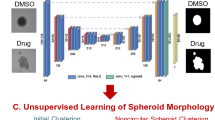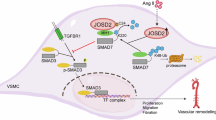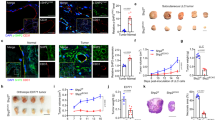Abstract
Angiotensin II (Ang II), which is an important mediator of both vascular responsiveness and growth, has been shown to induce vascular smooth muscle cell (VSMC) hypertrophy via the activation of a complex series of intracellular signaling events. Heat shock protein 70 (Hsp70) has recently been shown to protect against Ang II-induced hypertension. In this study, we tested the hypothesis that Hsp70 can protect VSMC from Ang II-induced hypertrophy. We treated VSMCs with Ang II to induce hypertrophy and to activate MAPK signaling pathway. We observed that the augmentation of Hsp70 expression inhibited Ang II-stimulated VSMC hypertrophy. This inhibitory effect of Hsp70 appears to be partly due to extracellular signal-regulated kinase (ERK1/2) inactivation, which in turn, may possibly result from the accumulation of MAP kinase phosphatase-1 (MKP-1).
Similar content being viewed by others
Article PDF
Author information
Authors and Affiliations
Rights and permissions
This is an Open Access article distributed under the terms of the Creative Commons Attribution Non-Commercial License (http://creativecommons.org/licenses/by-nc/3.0/) which permits unrestricted non-commercial use, distribution, and reproduction in any medium, provided the original work is properly cited.
About this article
Cite this article
Zheng, Y., Im, CN. & Seo, JS. Inhibitory effect of Hsp70 on angiotensin II-induced vascular smooth muscle cell hypertrophy. Exp Mol Med 38, 509–518 (2006). https://doi.org/10.1038/emm.2006.60
Published:
Issue date:
DOI: https://doi.org/10.1038/emm.2006.60
Keywords
This article is cited by
-
Dexmedetomidine alleviates inflammatory response and oxidative stress injury of vascular smooth muscle cell via α2AR/GSK-3β/MKP-1/NRF2 axis in intracranial aneurysm
BMC Pharmacology and Toxicology (2022)
-
Molecular Cloning of OSP94: A Significant Biomarker Protein of Hypertensive Human Heart and a Member of HSP110 Family
Molecular Biotechnology (2009)



